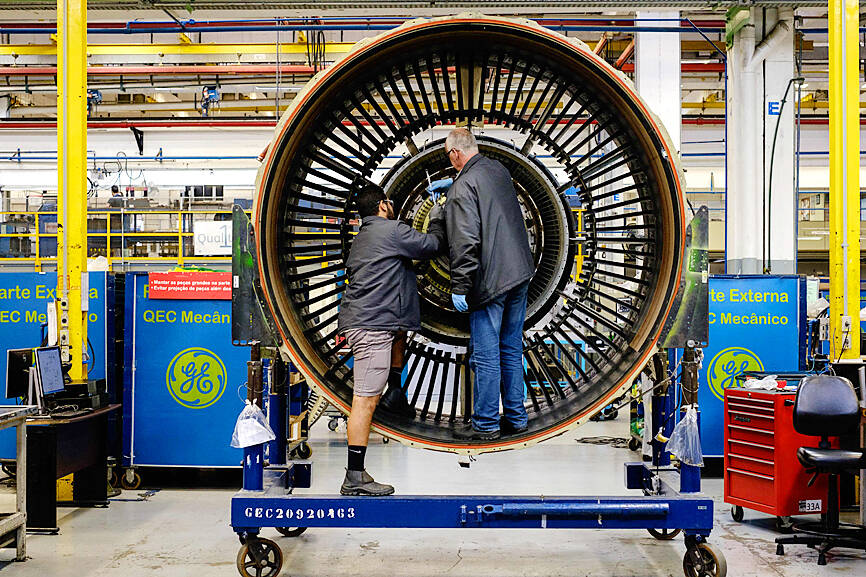A Chinese engineer was on Wednesday sentenced to eight years in a US prison for providing a provincial government in China with information on possible recruitment targets.
Ji Chaoqun (紀超群), who first traveled to the US on a student visa in 2013 and later enlisted in the US Army Reserve, was accused of identifying US scientists and engineers that could be recruited by the Jiangsu Ministry of State Security.
The body is a key Chinese intelligence unit involved in numerous schemes to illegally obtain US industrial and trade secrets.

Photo: AP
Ji was arrested in September 2018 on charges that he had supplied Chinese intelligence bodies with biographical information about eight people, all naturalized US citizens originally from Taiwan or China, and some of whom were US defense contractors.
Ji, who is about 31 years old, was in September last year convicted of illegally acting as an agent of a foreign government and of making false statements after a two-week trial in Chicago.
The charge is often used by federal prosecutors in espionage-related cases in which the accused is not clearly a foreign intelligence agent.
The US Department of Justice said that Ji acted at the direction of Xu Yanjun (徐延軍), a deputy division director in the Jiangsu ministry.
Ji’s case was apparently linked to Chinese efforts over several years to steal trade secrets from Ohio-based GE Aviation LLC — one of the world’s leading aircraft engine manufacturers — and other aviation companies, including US military suppliers.
Xu was a key figure in that effort. Arrested in Belgium in 2018, he was extradited to the US to stand trial
He was in November 2021 convicted of economic espionage and attempted theft of trade secrets.
In November last year, he was sentenced to 20 years in prison.

LONG FLIGHT: The jets would be flown by US pilots, with Taiwanese copilots in the two-seat F-16D variant to help familiarize them with the aircraft, the source said The US is expected to fly 10 Lockheed Martin F-16C/D Block 70/72 jets to Taiwan over the coming months to fulfill a long-awaited order of 66 aircraft, a defense official said yesterday. Word that the first batch of the jets would be delivered soon was welcome news to Taiwan, which has become concerned about delays in the delivery of US arms amid rising military tensions with China. Speaking on condition of anonymity, the official said the initial tranche of the nation’s F-16s are rolling off assembly lines in the US and would be flown under their own power to Taiwan by way

‘OF COURSE A COUNTRY’: The president outlined that Taiwan has all the necessary features of a nation, including citizens, land, government and sovereignty President William Lai (賴清德) discussed the meaning of “nation” during a speech in New Taipei City last night, emphasizing that Taiwan is a country as he condemned China’s misinterpretation of UN Resolution 2758. The speech was the first in a series of 10 that Lai is scheduled to give across Taiwan. It is the responsibility of Taiwanese citizens to stand united to defend their national sovereignty, democracy, liberty, way of life and the future of the next generation, Lai said. This is the most important legacy the people of this era could pass on to future generations, he said. Lai went on to discuss

MISSION: The Indo-Pacific region is ‘the priority theater,’ where the task of deterrence extends across the entire region, including Taiwan, the US Pacific Fleet commander said The US Navy’s “mission of deterrence” in the Indo-Pacific theater applies to Taiwan, Pacific Fleet Commander Admiral Stephen Koehler told the South China Sea Conference on Tuesday. The conference, organized by the Center for Strategic and International Studies (CSIS), is an international platform for senior officials and experts from countries with security interests in the region. “The Pacific Fleet’s mission is to deter aggression across the Western Pacific, together with our allies and partners, and to prevail in combat if necessary, Koehler said in the event’s keynote speech. “That mission of deterrence applies regionwide — including the South China Sea and Taiwan,” he

UNPRECEDENTED: In addition to the approved recall motions, cases such as Ma Wen-chun’s in Nantou are still under review, while others lack enough signatures The Central Election Commission (CEC) announced yesterday that a recall vote would take place on July 26, after it approved the first batch of recall motions targeting 24 Chinese Nationalist Party (KMT) lawmakers and Hsinchu Mayor Ann Kao (高虹安). Taiwan is in the midst of an unprecedented wave of mass recall campaigns, following a civil society push that echoed a call made by Democratic Progressive Party (DPP) caucus whip Ker Chien-ming (柯建銘) in January to initiate signature drives aimed at unseating KMT legislators. Under the Civil Servants Election and Recall Act (公職人員選舉罷免法), Taiwanese can initiate a recall of district-elected lawmakers by collecting